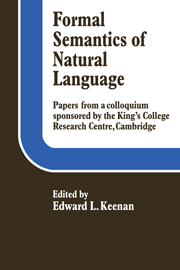Book contents
- Frontmatter
- Contents
- Notes on the contributors
- Acknowledgements
- Introduction
- I QUANTIFICATION IN NATURAL LANGUAGE
- II REFERENCE AND CROSS REFERENCE
- III INTENSIONAL LOGIC AND SYNTACTIC THEORY
- IV QUESTIONING MODEL THEORETIC SEMANTICS
- Model theoretic semantics and natural language
- Model theory and linguistics
- V PRAGMATICS AND SENTENCES IN CONTEXT
- VI SEMANTICS AND SURFACE SYNTAX
Model theory and linguistics
Published online by Cambridge University Press: 05 November 2011
- Frontmatter
- Contents
- Notes on the contributors
- Acknowledgements
- Introduction
- I QUANTIFICATION IN NATURAL LANGUAGE
- II REFERENCE AND CROSS REFERENCE
- III INTENSIONAL LOGIC AND SYNTACTIC THEORY
- IV QUESTIONING MODEL THEORETIC SEMANTICS
- Model theoretic semantics and natural language
- Model theory and linguistics
- V PRAGMATICS AND SENTENCES IN CONTEXT
- VI SEMANTICS AND SURFACE SYNTAX
Summary
Model theory is a mathematical technique for investigating certain properties of formal systems: properties such as consistency, completeness, the finite model property and having a decision procedure. Instead of looking for proofs based directly upon the formal system being studied, the method is to relate it to other formal systems whose properties are already known, by defining a translation from the former to the latter. Where this can be carried through, the systems thus related to the one under investigation are termed ‘models’ of it and known properties of the models can then be extrapolated to the new system. If a natural language or a fragment of a natural language constitutes a formal system, then the technique can be applied to it also, for the same purposes. There is now a prevalent impression among linguists, however, that model theory can provide a theory of meaning for natural language. The thesis of this paper is that any such hope will certainly be disappointed and that the mistake has arisen from confusion among mathematicians about the correct description of their own procedure.
This confusion is illustrated by the following descriptions of model theory from a recent book on mathematical logic: ‘Model theory is the study of the relations between languages and the world, or more precisely between formal languages and the interpretations of formal languages' (Crossley et al. (1972:20)). The idea which links these two descriptions is that interpretations of formal languages are not, as I have claimed, other formal languages, but structures, ‘the world’ being the structure which interprets a natural language.
Information
- Type
- Chapter
- Information
- Formal Semantics of Natural Language , pp. 241 - 250Publisher: Cambridge University PressPrint publication year: 1975
